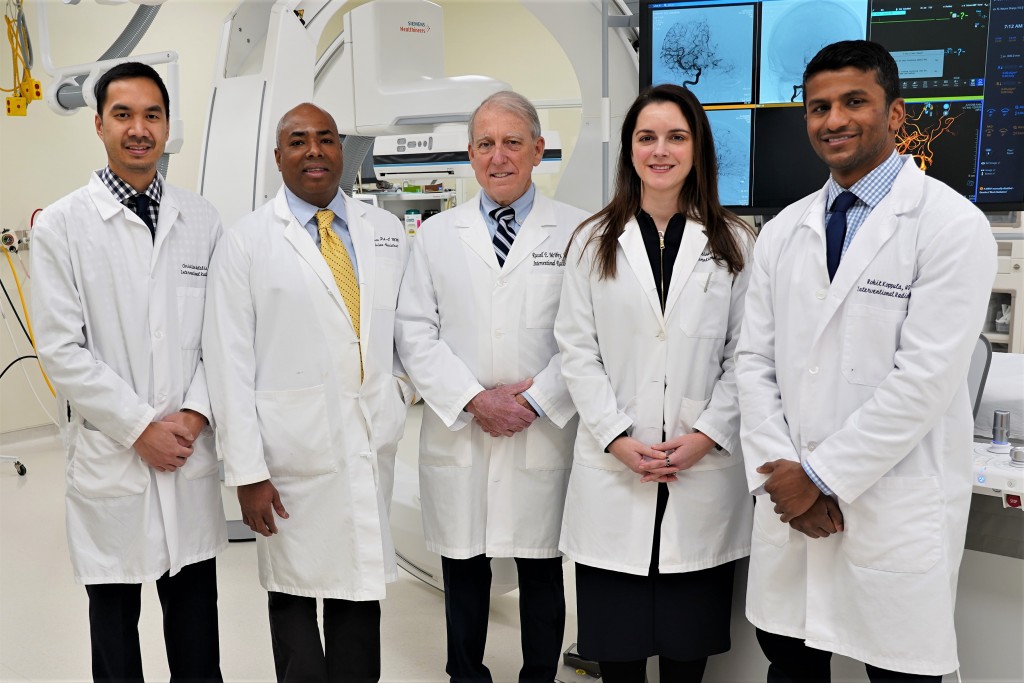Interventional Radiology Services

Interventional Radiology Providers at NVRC
At NVRC, our team of Interventional Radiologists specialize in the diagnosis and treatment of a wide range of diseases. Explore the links below to learn more about treatments which may be available to you.
Cancer Therapies:
Our team understands how difficult a cancer diagnosis can be. We are available to assist in various aspects of cancer care, from reviewing oncologic imaging to discussing treatment options. We work closely with other specialists including medical, surgical, and radiation oncologists to customize the best treatment for each of our patients:
Biopsies: We offer safe, imaged-guided biopsies which can establish diagnoses and direct further treatment. We tailor our approach to each patient by using a variety of modalities to perform the biopsy, including fluoroscopy, CT, and ultrasound. These can be performed as outpatient procedures with the use of local anesthetics and IV sedation, if necessary.
Tumor Ablation: This technique utilizes the precise application of thermal or cryoablative energy to destroy tumor cells while minimizing collateral damage to surrounding tissues. It can serve as a great alternative to surgery with decreased complication rates and faster recovery times. Among other locations, ablations are often used to treat solid organ tumors in the liver and kidney.
Tumor embolization: This technique involves the delivery of localized chemotherapy or radiation to tumors in the liver. From a pinhole access in the wrist or thigh, this procedure is performed by navigating small catheters into tumor-supplying arteries, often sparing healthy portions of the organ. This can serve as an adjunct or alternative to whole body chemotherapy / surgery, often with a significantly improved side-effect profile.
Venous Access: We offer several different venous access options for patients who require chemotherapy or other medications. These range from short-term midlines which can be used for several weeks, to longer-term mediport catheters which can be used intermittently for years. These solutions allow patients to receive treatment safely and conveniently on an outpatient basis.
Dialysis Access:
For patients with malfunctioning or clotted arteriovenous fistulas or grafts, we perform fistulagrams to identify problems which can result in inefficient or insufficient hemodialysis. We also place and manage dialysis catheters for those requiring more immediate or short-term access.
Vascular Disease:
Our physicians have fellowship training in the diagnosis and management of the full spectrum of arterial and venous diseases. We have expertise in interpreting various modalities such as CT, MRI, and ultrasounds (performed on-site in our fully accredited vascular lab).
Additionally, we work closely with wound care specialists, vascular surgeons, and podiatrists to provide comprehensive, multidisciplinary vascular care for our patients.
Common cardiovascular conditions:
- Aortic Aneurysms
- Peripheral Arterial Disease / Critical Limb Ischemia
- Pulmonary Embolism
- Deep Venous Thrombosis
- Superficial Venous Insufficiency / Venous varicosities
Schedule a consult to learn more if you have known vascular disease or are experiencing tell-tale symptoms which can include skin discoloration, pain with exercise, or leg swelling.
Women’s Health:
Uterine Fibroids: Fibroids are a common condition, especially in pre-menopausal women. These can result in heavy menstrual bleeding, as well as symptoms such as abdominal pressure, pain and cramping.
Uterine artery embolization (UAE) is a minimally invasive therapy performed through a pinhole incision in the arm or leg and serves as an effective treatment for fibroid related symptoms. This uterine preserving procedure can be performed without the use of general anesthesia and results in smaller hospital stays (outpatient or one-night stay) compared to surgical therapies such as hysterectomies and myomectomies.
Visit https://ask4ufe.com/all-about-fibroids/ to learn more, and schedule a clinic visit to discuss whether this treatment option is right for you.
Pelvic congestion syndrome: Chronic pelvic pain is a common condition, with pelvic congestion syndrome (PCS) being an often-overlooked etiology. This condition results from abnormally dilated veins in the pelvic region. Symptoms are often precipitated by pregnancy and can include pelvic heaviness, aching, or pain. These can often be worse with menstruation, long periods of standing, or intercourse.
Schedule a clinic visit with our physicians to learn whether PCS could be contributing to your symptoms, and to discuss minimally invasive treatment options.
Fallopian Tubal Recanalization: While there are several causes for infertility, blockages of the fallopian tubes can account of 25-30% of cases. At NVRC, our physicians work with your OBGYN to diagnose this condition through an outpatient procedure known as a hysterosalpinogram (HSG). If a blockage is found, we can perform a recanalization procedure to help re-open these occluded tubes.
Men’s Health:
Prostate artery embolization: Benign prostatic hyperplasia (BPH) is one of the most common conditions affecting older men (70% of men over 70). Enlargement of the prostate over time can cause symptoms including difficult, frequent, and painful urination.
Prostate artery embolization (PAE) provides an effective minimally invasive alternative to traditional surgical options with fewer complications, and is more effective than medical treatments. This involves navigating small catheters into the arteries which supply the gland and injecting particles to decrease blood flow. Doing so results in gland shrinkage and subsequently, symptomatic relief over the course of weeks to months. PAE can be performed as an outpatient procedure.
Varicocele embolization: For men suffering from symptomatic varicoceles, we offer an a minimally invasive embolization procedure to close down the abnormal venous pathways without requiring surgery.
Pain Palliation:
As specialists in both imaging and minimally invasive interventions, our physicians have expertise in procedures designed to alleviate pain throughout the body. These are performed on an outpatient basis and can help you return to previous levels of activity. In certain scenarios, these procedures can help patients avoid major surgeries.
Commonly performed treatments include:
- Spinal epidural steroid injections
- Joint injections
- Treatment of spinal compression fractures (kyphoplasty / vertebroplasty)
- Visceral nerve blocks
